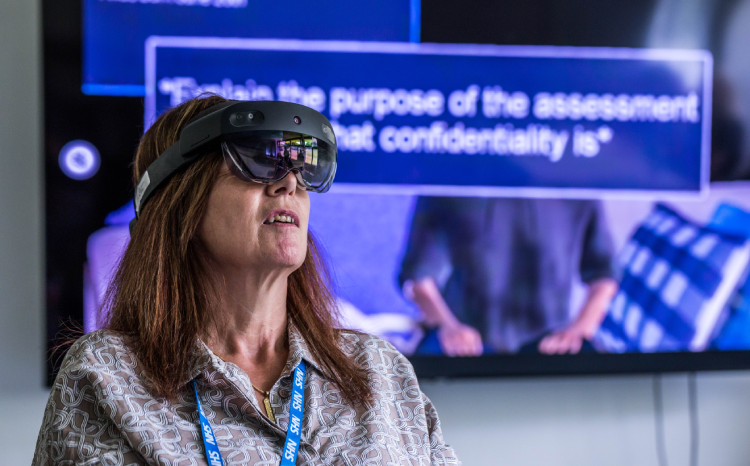Key Takeaways
- An augmented reality app for mental health crisis simulation training has been co-developed by Tees, Esk and Wear Valleys NHS Foundation Trust and Teesside University.
- The app enhances student nurses’ skills, with initial pilot results showing a 51% increase in knowledge and a 63% boost in confidence.
- The initiative is part of a larger NHS project to implement AR technology in medical training across the North East of England.
Innovative AR Training for Student Nurses
Tees, Esk and Wear Valleys NHS Foundation Trust, in collaboration with Teesside University, has launched what is touted as England’s first augmented reality (AR) mental health crisis simulation training app. This innovative app methodically teaches student nurses how to effectively support individuals in mental health crises.
Simulating a crisis assessment scenario, the app allows students to interact with a virtual character named Paul, who has been referred to a local crisis team due to mental health concerns. Through the use of an AR headset, students can visit Paul’s home, engage with him, and respond to his needs through a series of pre-defined questions that generate varied interactions and outcomes.
Senior nurse practice placement facilitator Jools Smithies emphasized the educational value of the simulation, stating, “The AR pauses at various points within the simulation to allow the students to discuss their thoughts with a supervisor.” This feature encourages participants to consider critical aspects like safeguarding during their decision-making process. This training aims to fortify important skills such as communication, signposting, and crisis assessment, ultimately boosting students’ confidence.
Initial trials of the headset began in September 2023, leading to the purchase of two HoloLens devices in 2024 for further testing of the mental health app. Developed by Tucan Studio at Teesside University in collaboration with trust staff, the app integrates professional insights into mental health and assessment skills, complete with a script voiced by a local actor.
As part of the NHS-led Placement, Expansion, Technology, augmented Reality (PETaR) project, the AR app seeks to expand its applications to various medical contexts, including surgical and community settings across North East NHS trusts. Abigail Green, an associate professor in clinical simulation at Teesside University, remarked on the app’s significance, noting that it gives students valuable experience without the limitations of direct supervision.
“From the perspective of sending our students to a simulated placement, it gives them an opportunity to practice and rehearse scenarios,” Green explained. The immersive experience allows students to gain insights into the patient experience, which they might not have otherwise understood.
The project has garnered support from the Enabling Effective Learning Environment team within the NHS North East and North Cumbria Integrated Care System and has been initially piloted within the trust’s nursing education department. Plans are underway to potentially expand its availability across the country.
In a complementary development within the realm of health technology, digital therapeutic software firm Strolll recently secured £10.35 million for AR glasses aimed at assisting individuals with neurological disorders such as Parkinson’s disease, stroke, and multiple sclerosis.
The content above is a summary. For more details, see the source article.















